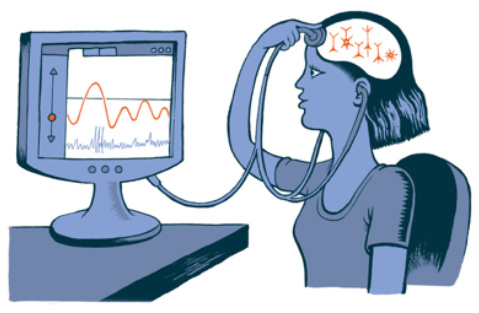Neurofeedback
–
–
Real-time feedback is given on specific brain waves (EEG), allowing the brain to learn to produce a certain activity through a self-regulating process.
Electrodes placed on the scalp and mastoids capture the electrical activity of the brain which is visible directly on a screen facing the patient. Visual and auditory positive reinforcement will be given to the patient whenever he reaches a desired state of awakening (concentration, relaxation) there by promoting proactive training of his cerebral activity and his mental states.
Numerous scientific studies have shown the beneficial effects of neurofeedback in the medium- and long-term in improving symptoms of various neurological and neurodevelopmental disorders. These include epilepsy, Attention Deficit Hyperactivity Disorder (ADHD), Sleep disorders, autistic disorders and post-traumatic stress disorder (PTSD).
Neurofeedback requires skills in neurophysiology, learning sciences, health psychology, cognitive-behavioural therapies, validated through demanding training, and accreditation to the Biofeedback Certification International Alliance (BCIA) only acquired after years of practice.
Neurofeedback is not a means for curing all symptoms and all diseases. It is important to be informed about the type of system used ,has it been scientifically validated in controlled studies?,What training and academic background does the practitioner have? What is the care framework?
Exemple of a bio and neurofeedback session as a therapeutic management of attention deficit disorder, hyperactivity and emotional impulsivity in a young boy.
“ Unlike medication, the success of feedback training also depends on the motivation of the client and the skills of the therapist”

Matteo Farinella